
Rohit has been having this uneasy feeling that he is not properly insured. He already has an insurance of Rs.75 Lakhs and his company also offers another Rs.30 Lakhs. He had consulted his friend Parth, who informed him that he might be over insured considering that Rohit is a bachelor and has no dependants. Rohit’s parents live in Shimla and have their own home and pension.
But Rohit was not convinced, for he was earning about Rs.20 Lakhs pa and having a cover of just five times his gross income, seemed like too much of an under insurance to him. Parth has, infact, asked him as to why Rohit wants insurance. “If you were to pass away tomorrow, who will this money go to?”, Parth had asked. Rohit had replied that it will make his parents richer by over a crore. Parth immediately asked him why his parents required that money considering that they are financially independent. Rohit, ofcourse, understood that. But he had said,”I want to provide a cushion to my parents in case I’m not around”.
So, that was the problem. Rohit failed to see that he does not have to provide any further cushion than he had already provided, through the Rs.1 Crore cover that he has. He came to see me regarding this.
I understood the moment he narrated the whole thing that Parth had been right all along. Insurance is to cover the financial loss to the family in the event of the income earner passing away. Hence, insurance is primarily a security net to the dependants. As a corollary, if there were no dependants, there is no need for any insurance as there is no one who will suffer financially, if the insured is no more.
Rohit wanted to know then if the thumb rule of 8-10 times the gross income for the amount of insurance cover, does not apply to him. I told him that it does not apply and that he might actually be over insured at this point.
I suggested that what he should be actually looking for is accident insurance cover. He was all ears. I explained that accidental death is not the only thing it covers but also partial and total disability. Also, it covers Temporary Total Disability ( TTD ), when a person is unable to work for a period, due to the debilitating effects of the accident. In this period, an accident insurance policy with TTD cover would partially reimburse the insured for income lost. Policies typically offer 1% of the TTD Sum Assured per week as a benefit for upto 104 weeks. This could be a very useful addition in one’s insurance matrix. Rohit seemed convinced.
Critical illness insurance is another one could consider. Rohit has medical insurance of Rs.5 Lakhs and would cover any illness. However, the onset of a critical illness can potentially curtail the working life and can impact a person, financially. Hence, a critical illness insurance would prove useful as it gives a lumpsum payment on the onset of certain critical illnesses. This is a benefit policy and not a reimbursement for expenses incurred.
Rohit was excited to know about this. He wanted to know the definition of critical illnesses and which ones would be covered. I had to inform him that the catch actually lies there as critical illness policies covers only 8-12 diseases/ conditions whereas a person can suffer from any number of illnesses. It however covers the most common ones like cancer, heart attack, stroke etc. and is admittedly not a comprehensive list. However, it can still help to a limited extent. Rohit wanted to know to what extent he can take this insurance. Most companies offer between 5-10 Lakhs, though there are companies offering upto Rs.50 Lakhs. I had suggested that he consider about Rs.10 Lakhs.
Rohit wanted to know if he should take the accident and critical illness as riders. I advised that having stand-alone policies are better as they do offer better benefits as opposed to riders. Also, some riders terminate the policy too if they get activated.
Rohit seemed to be in thought. At least he was not harping any longer on life insurance. He seemed to have understood this. I left him to think it over carefully before acting.
FPG India ©2024. All Rights Reserved.
Designed & Developed by W3M Technoz
Comments are closed.